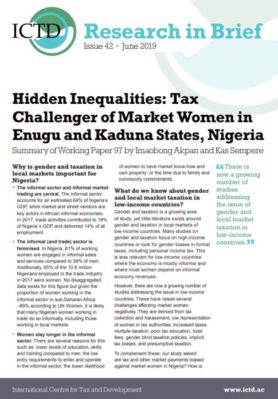Research in Brief 42
This paper explores how tax collection is experienced differently by female and male market traders in two Nigerian states. Based on a survey of 451 market traders in 12 markets and ethnographic research in four markets, two main findings emerged from the study – the benefits of having female tax collectors to reduce incidences of physical, sexual and verbal harassment in tax collection in markets and the negative effects of presumptive taxation on market women as they earn less for all products analysed but are taxed the same as men. The first finding adds to the literature on the benefits of recruiting more women in tax administrations while the second adds to the literature on gender implicit biases in taxation. Specifically, the second finding highlights the importance of acknowledging implicit gender biases related to presumptive taxation in the informal sector. For instance, presumptive taxation is not recognised as a category in the seminal conceptual framework suggested by Stotsky (1996) to analyse explicit and implicit gender biases. The framework only identifies personal income tax, corporate income tax, commodity tax, and trade taxes. Both the informal and trade sectors in Nigeria are feminised, with the aggravating circumstance that women stay longer in the informal sector than men. Therefore, the category of presumptive taxation in local markets cannot be ignored in the area of gender equality and taxation in low-income countries – in fact, it is central. This brief is a summary of Working Paper 97 by Imaobong Akpan and Kas Sempere.
